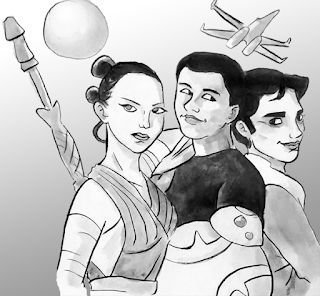Life Lessons from Star Wars: The Force Awakens
As a frugal couple, Croissant and I are legally obligated to prefer watching movies at home on Netflix with homemade popcorn to going to the movies. And usually, we genuinely do. With that said, I probably would have gone to see Star Wars: The Force Awakens when it came out in December if I hadn't been burned by the prequel trilogy. I was scrupulously careful to treat it like any other blockbuster movie, i.e., I didn't see it.
Well, we finally saw it in a small theater on May the Fourth, and I don't need to tell you that I liked it, or why. In many ways I think it's better than the original trilogy, because there are more girls in it.
This article is a shameless excuse to post fan art. But there are some life lessons in this space lasers movie, I think! I can wring life lessons out of anything!
Spoilers, if you, like me two days ago, are one of the few people in the world who never saw Star Wars.
Follow your conscience, even when you're the only one.
The movie opens with a scene of storm troopers sacking a village. One of the troopers stands out, though he's dressed in identical face-obscuring armor as the rest. His body language is nervous, unsure; he keeps looking around to see what others are doing. He's the only one not moving in lockstep with the others, and he's also the only one acting with compassion, rushing to help fallen soldiers and lowering his gun when the group is ordered to kill the villagers.
We don't know why Finn was apparently the only storm trooper to develop a conscience. Perhaps he's just the only one who had both a conscience and the guts to be different. Finn refuses to behave like the others around him, and as soon as he can, he escapes and joins up with the rebel Resistance.
Even as individuals with free will, not mentally controlled clones created for the sole purpose of killing, it can be hard to resist peer pressure. It's natural to use other people as a barometer for your own actions (is what I'm doing weird or normal? should I be doing this? can I be doing this?). But, depending on who you are using for comparison, you can get skewed results. If you're surrounded by storm troopers, "normal" is going to look a lot different than if you're surrounded by a ragtag band of heroes.
It takes strength of mind and purpose to break away from the beaten path and blaze your own trail. It's important to question what you are doing in the abstract (is what I am doing moral? does it feel right to me?) It's also really helpful to surround yourself with people whose ethics and life choices match your ideals, as Finn did.
Admit when your current strategy isn't working.
One fun trick the filmmakers pulled is making Rey, the obvious hero of the story, opposite of Luke Skywalker in one important way. While Luke longed to leave his backwater desert homeworld and go on adventures, Rey wants nothing more than to stay put.
She spends her days scavenging for parts in a junkyard, backbreaking work that results in barely subsistence wages. She has a heroic personality, curious and resourceful, and heroic skills: she can fly, shoot, and, she eventually learns, can use the Force. She has visions about her destiny, but she resists it. Even when she finds herself on the most beautiful planet she's ever seen, wowed by the green trees and abundant water, all she wants is to go home.
Why? It's not because she loves her desert. She isn't a homey hobbit, and she's not thriving in her present life. it's because she's waiting. When she was a child her family told her they'd be back for her, and she's been waiting ever since. She worries that if she leaves, they won't be able to find her.
I have a feeling we will learn more about this backstory later in the series, but for now, it seems clear to everyone besides her that whoever she's waiting for isn't coming back. But Rey stubbornly persists in her belief that they will, for emotional reasons, but also, perhaps, for reasons of inertia.
Chip and Dan Heath's Decisive has an instructive tip that might have helped Rey. When you are trying out a particular tactic, create a trigger that will cause you to re-evaluate your course of action and see if it's working. For example, you might say, "I will wait here for two years, but if my family doesn't come back by the fifteenth of Jagzorp, year 5893, I will leave word with someone and move on."
Choose mementos that are both sentimental and useful.
Like many fantasy sagas, the Star Wars series is full of important artifacts rich with meaning and history. Luke's light saber is a classic example: he inherited it from his father. In this movie, it is passed between several characters, ending up where it seems to belong, with Rey. In addition to its history and sentimental meaning, it's a utilitarian tool, and a really useful one. (I'd be remiss here if I didn't also mention Poe's flight jacket.)
The characters in Star Wars are nomadic, so they have to be very selective about what they carry with them. A few of them seem to live aboard ships, but even these are sparsely decorated. If you only have a few possessions, it's crucial to keep only meaningful objects that are additionally useful in your everyday life. Wouldn't you rather have Luke's light saber or Poe's jacket than Kilo Ren's mangled and charred Vader head?


Comments
Post a Comment